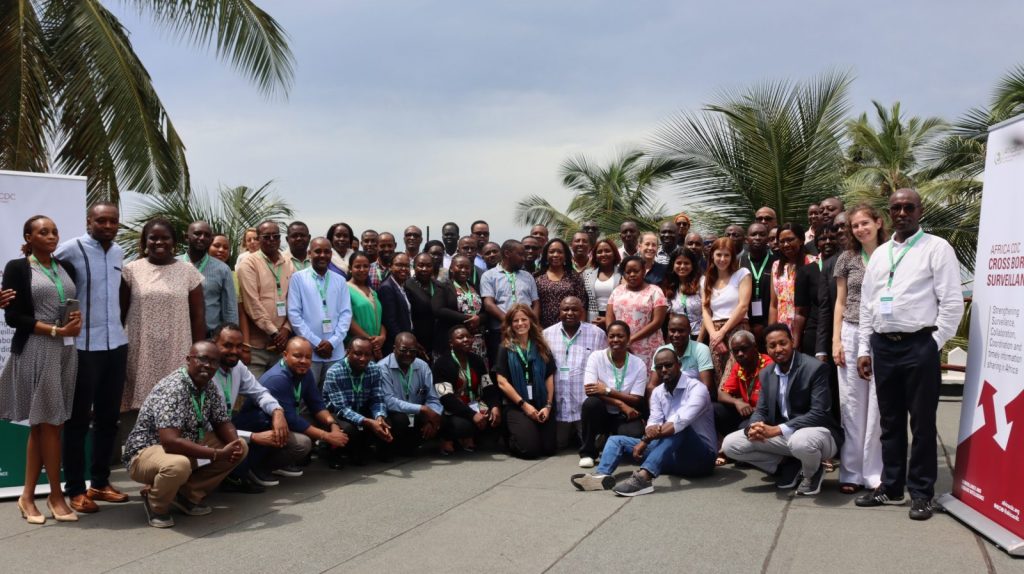To strengthen regional cross-border Risk Communication and Community Engagement (RCCE) readiness during public health emergencies, Africa CDC, UNICEF, IFRC, and WHO (the Collective Service core partners), as well as IOM, READY, and the UK-PHRST organized a simulation-based training from 15 to 19 April 2024 in Mombasa, Kenya.
This training aims to bolster cross-border RCCE for coordinated regional emergency preparedness and response. Participating countries include Ethiopia, Kenya, Rwanda, Somalia, South Sudan, Tanzania, and Uganda. Enhancing cross-border collaboration is crucial given the region’s interconnectivity and frequent emergencies, including public health outbreaks such as Ebola, Marburg, cholera, and yellow fever.
“In addressing the challenges of health security in the region, it is crucial to recognize the imminent risks posed by dynamic cross-border movement,” stated Dr. Lul Riek, Regional Director for the Eastern and Southern Africa Regional Coordinating Centres at Africa CDC. “Limited cross-border coordination and weak mechanisms for RCCE compound these challenges. By strengthening our regional collaborations and enhancing our RCCE strategies, we can more effectively deliver timely, clear, and culturally sensitive information that empowers communities to take informed actions during health crises.”
Over the past few years, RCCE has been a critical component in outbreak response in East and Southern Africa, notably in supporting the social and behavioral change needed to uptake health interventions and practical emergency readiness and response. Through RCCE, communities are kept informed, a coordinated system is in place to manage risks, and evolving needs during crises can be managed. This shift began with preparedness activities during the 2018 Ebola Virus Disease (EVD) outbreak. Since then, initiatives including the Collective Service, through the COVID-19 pandemic and subsequent emergencies in the region—have reinforced the critical role of collaboration between partners for the coordinated delivery of RCCE during health emergencies and the promise of leveraging community insights to inform and tailor other key pillars of a response.
“The urgency of our mission is heightened by a myriad of emergencies, including missed vaccinations, conflict, climate-sensitive diseases, and climate-related disasters that increasingly threaten community resilience and livelihoods in the region. These disasters exacerbate vulnerabilities among dynamic and mobile populations and children, presenting unique challenges to our response strategies. We need to continue to work together as response actors across pillars and borders to share and rapidly respond to recommendations emerging from community feedback and social science data for more community-centered responses,” said Lieke van de Wiel, UNICEF Eastern and Southern Africa Deputy Regional Director.
Over the years, RCCE activities have evolved beyond one-way risk communication by Ministries of Health and partners. Today, the focus lies in coordinated approaches that engage affected communities, listen to their concerns, and harness qualitative and quantitative data. Community feedback mechanisms, qualitative research, and data triangulation drive targeted responses across online/digital and offline channels. These efforts deepen our understanding of critical behaviors for outbreak response and promote preventive measures.
“Let us leverage the power of data and evidence-based practices to inform our decision-making processes and tailor our interventions, including messaging, to the specific needs of each community. By embracing innovation and utilizing new technologies, we can enhance our ability to gather, analyze, and utilize RCCE data effectively, thereby enhancing our overall response capacity.” Dr Daniel Langat, Head of Surveillance and Response, Ministry of Health Kenya.
By convening key government actors and public health partners, RCCE partners aim to develop standard operating procedures (SOPs), action plans, and training packages to improve RCCE readiness and data utilization for effective community-centered responses to outbreaks and disasters. This workshop protects children and vulnerable communities and maintains essential services during emergencies.
Sophie Everest, UK-Public Health Rapid Support Team RCCE Specialist at the UK Health Security Agency, said: “The UK-PHRST is delighted to be involved in this partnership of RCCE experts from across Eastern and Southern Africa to share technical expertise and facilitate scenario-based exercises to help strengthen community-led outbreak responses in the future. It is the first time that the Ministries of Health, Africa CDC, Red Cross and Red Crescent National Societies, WHO, and UNICEF colleagues from across these countries have come together to discuss and plan how to prioritize this work. We look forward to supporting these plans moving forward.”
As emergency response partners in the region navigate a complex landscape of health emergencies exacerbated by climate change and conflict, RCCE remains a critical tool in bridging knowledge, collaboration, and action to support resilience, preparedness, and community well-being.
Africa CDC and UNICEF, in collaboration with IFRC, WHO, UK-PHRST, and other partners, are committed to spearheading additional cross-border RCCE capacity-building workshops, thereby reinforcing resilience, preparedness, and community well-being throughout the region.

